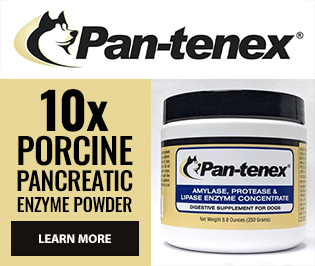How Enzymes and Diet Changes Can Help Relieve Dog Diarrhea
Diarrhea in dogs is never fun to deal with, and it can often be a sign that something deeper is going on with your dog’s digestion. In many cases, poor digestion or food intolerances can contribute to loose stools. Thankfully, adjusting your dog’s diet and adding digestive enzymes can make a noticeable difference.
Understanding the Causes of Diarrhea
Dogs may experience diarrhea for several reasons, including sudden food changes, eating something inappropriate, intestinal parasites, stress, or poor nutrient absorption. If your dog has recurring loose stool, especially after meals, it may point to an issue with digestion.
When a dog’s body cannot fully break down fats, proteins, or carbohydrates, undigested food can irritate the intestines and lead to loose or watery stool. Supporting digestion from the start of the feeding process helps relieve stress on the gut and improve stool consistency.
How Digestive Enzymes Can Help
Digestive enzymes help by breaking down food before it reaches the small intestine. This allows for better nutrient absorption and reduces the amount of undigested material that could trigger digestive upset.
Many dog owners have seen firmer stools and less digestive distress within days of adding a high-potency enzyme product to meals. Pan-tenex is a 10x potency porcine enzyme powder trusted by thousands of dog owners to support healthy digestion and improve stool quality.
Feeding Guidelines Matter
Enzymes should be added to moistened food and allowed to sit for 15 minuets before feeding. This gives the enzymes time to begin working before the food is swallowed. For step-by-step instructions, see our article How to Mix Enzyme Powder with Your Dog’s Food.
It is important to note that dosing may vary by product, and/or meal size. Always read the instructions carefully. As with any supplement, digestive enzymes should only be given under the guidance of your veterinary professional.
Choose a Gentle, Low-Residue Diet
While enzymes help with digestion, choosing the right food is just as important. Diets that are easier on the stomach and lower in fiber can help reduce the workload on the digestive system.
- Feed meals with moderate fat and protein
- Avoid high-fiber or grain-heavy diets
- Choose single-protein sources with limited ingredients
- Skip table scraps and rich treats
Our article Best Diets for Dogs Needing Digestive Enzymes: Low-Fiber Options explains more about diet adjustments that can complement enzyme support.
Track Progress Over Time
Some dogs improve within days of starting digestive enzymes and changing their diet, while others may take a week or two. It’s helpful to keep notes on your dog’s stool, appetite, and energy levels. Use our printable Dog Enzyme Digestive Health Stool Tracker to monitor changes during this period.
When to Seek Veterinary Help
If your dog has persistent diarrhea that doesn’t improve with dietary changes and enzymes, consult your veterinarian. Diarrhea can also be a sign of infection, parasites, or a more serious medical condition that requires professional treatment.
Digestive enzymes and diet adjustments are tools to support your dog’s health, not replacements for medical care. Always work with your vet when introducing any new supplement or making major diet changes.
Final Thoughts
Relieving diarrhea often starts with supporting your dog’s digestion. Digestive enzymes and diet changes can reduce intestinal stress and promote firmer, healthier stools. By taking a proactive approach and tracking your dog’s response, you can help them feel better faster.
To learn more, visit our other Help Articles or contact us with any questions.

